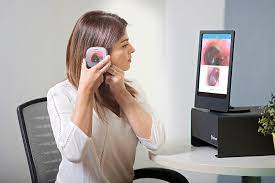Other key applications involve using AI in hardware that can collect key biometric data or enable onsite and remote physical examinations. Companies such as Eko, Tytocare and Aevice Health allow for the remote examination of heart and lung sounds, eyes and ears thanks to AI-embedded stethoscopes and other hardware. AI-based smartphone exams are being considered for a number of diagnostic purposes, from skin lesions and rashes to migraine headaches, ear infections and retinal diseases like diabetic retinopathy and age-related macular degeneration. Then there are apps like AiCure which are using AI to monitor whether patients adhere to their medical treatments. This adds another dimension to the rise of telehealth.
The thinking on telehealth has always been that it can facilitate remote visits for simple conditions but that if the clinician needs to examine the patient or collect labs, the patient will need to do an on-site visit. Well, with these emerging AI-enabled technologies to remotely examine the patient, plus the potential to carry out testing using AI on our cell phones, much more can be done remotely. This means more access to timely care and convenience for patients.
Another way of remotely managing patients is remote monitoring using sensors with the transmission of data to the healthcare providers. This is also an area where the traditional sensor technologies are being enhanced by the use of AI. Clairlab has an AI-based biosensor which is able to remotely monitor patients’ physiological markers (such as respiratory rate, heart rate, temperature and oxygen saturation) with no need for physical contact. It does this by tracking the light particles that are reflected off patients’ skin. Clairlab can also monitor behavioral markers like sleep patterns and stress to provide an assessment of a patient’s wellbeing. And we’ve already discussed how PhysIQ uses AI to turn sensor data into digital biomarkers to monitor COVID-19 patients at home.
Remote monitoring devices like insertable cardiac monitors (ICMs) have already provided a huge reduction on the amount of time that clinicians need to spend tracking patients’ conditions. French startup Implicity was recently granted 510(k) clearance by the FDA for its AI software, which is designed to analyze ECG data from ICMs (which are sometimes called implantable loop recorders or ILRs). Their ILR ECG Analyzer sorts through heart rhythm data in search of atrial fibrillation and arrhythmias, and the company says it’s more accurate than the implanted monitors themselves. Part of that is due to the fact that ICMs have a reputation for throwing up false-positive alerts of arrhythmia, each of which has to be reviewed and confirmed or rejected by clinicians
One 2020 study estimated that between 46% and 86% of instances flagged by Medtronic’s Reveal Linq device were misdiagnoses. A study of Implicity’s technology found that by applying the machine learning algorithm to ECG data collected by Medtronic’s ICMs, they were able to decrease false positives by nearly 80%






